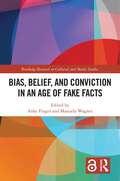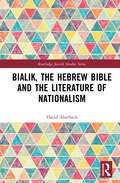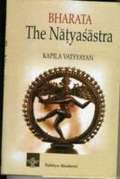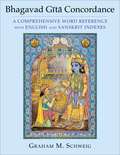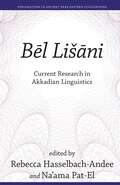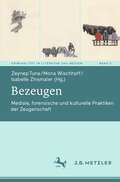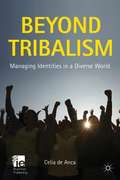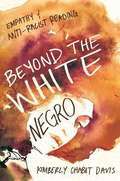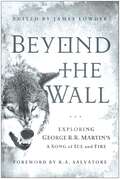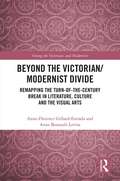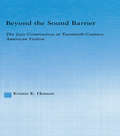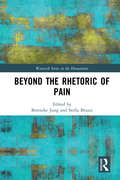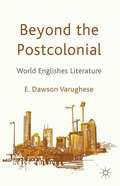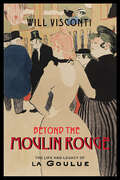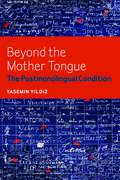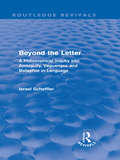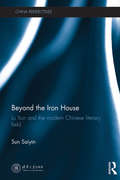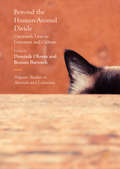- Table View
- List View
Bias, Belief, and Conviction in an Age of Fake Facts (Routledge Research in Cultural and Media Studies)
by Anke Finger Manuela WagnerIn this book, authors engage in an interdisciplinary discourse of theory and practice on the concept of personal conviction, addressing the variety of grey zones that mark the concept. Bias, Belief, and Conviction in an Age of Fake Facts discusses where our convictions come from and whether we are aware of them, why they compel us to certain actions, and whether we can change our convictions when presented with opposing evidence, which prove our personal convictions "wrong". Scholars from philosophy, psychology, comparative literature, media studies, applied linguistics, intercultural communication, and education shed light on the topic of personal conviction, crossing disciplinary boundaries and asking questions not only of importance to scholars but also related to the role and possible impact of conviction in the public sphere, education, and in political and cultural discourse. By taking a critical look at personal conviction as an element of inquiry within the humanities and social sciences, this book will contribute substantially to the study of conviction as an aspect of the self we all carry within us and are called upon to examine. It will be of particular interest to scholars in communication and journalism studies, media studies, philosophy, and psychology.
Bialik, the Hebrew Bible and the Literature of Nationalism (Routledge Jewish Studies Series)
by David AberbachThis book explores the life and poetry of Chaim Nachman Bialik (1873–1934) in the context of European national literature between the French Revolution and World War I, showing how he helped create a modern Hebrew national culture, spurring the revival of Hebrew as a spoken language. The author begins with Bialik’s background in the Tsarist Empire, contextualizing Jewish powerlessness in Eastern Europe in the late nineteenth century. As European anti-Semitism grew, Bialik emerged at the vanguard of a modern Hebrew national movement, building on ancient biblical and rabbinic tradition and speaking to Jewish concerns in neo-prophetic poems, love poems, poems for children, and folk poems. This book makes accessible a broad but representative selection of Bialik’s poetry in translation. Alongside this, a variety of national poets are considered from across Europe, including Solomos in Greece, Mickiewicz in Poland, Shevchenko in Ukraine, Njegoš in Serbia, Petőfi in Hungary, and Yeats in Ireland. Aberbach argues that Bialik as Jewish national poet cannot be understood except in the dual context of ancient Jewish nationalism and modern European nationalism, both political and cultural. Written in clear and accessible prose, this book will interest those studying modern European nationalism, Hebrew literature, Jewish history, and anti-Semitism.
Bhatnagar’s Advanced English Essays For IAS And Other examinations - Competitive Exams
by L. Jaikishan DasBhatnagar’s Advanced English Essays is a comprehensive guide for aspirants of competitive exams like the I.A.S., offering model essays that blend intellectual depth with literary elegance. The collection spans a wide range of themes, including politics, democracy, war, peace, science, education, literature, and current affairs, aiming to cultivate clear thinking and expressive writing in candidates. The essays avoid excessive scholarship or superficiality, instead striving for balance, substance, and structure. Each essay is crafted to demonstrate how complex issues can be explored with clarity, moral insight, and stylistic finesse. This revised and enlarged edition also includes literary essays addressing modern English literature, making it a valuable resource for postgraduate students as well. The author emphasizes the dual importance of thought content and its artistic presentation, highlighting that good essays are not only informative but also engaging in form. Overall, the book serves both as a training tool for developing essay-writing skills and as a reflection on significant social, political, and philosophical issues.
Bhasha Path (Bengali - Language Lessons) class 4 - West Bengal Board: বাংলা - ভাষাপাঠ চতুর্থ শ্রেণি
by West Bengal Board of Primary Educationভাষাপাঠ চতুর্থ শ্রেণির বাংলা পাঠ্যপুস্তক, যা পশ্চিমবঙ্গ প্রাথমিক শিক্ষা পর্ষদ কর্তৃক প্রকাশিত। জাতীয় পাঠক্রম রূপরেখা (২০০৫) ও শিক্ষার অধিকার আইন (২০০৯)-এর ভিত্তিতে এই বইটি রচিত হয়েছে, যেখানে প্রথাগত ব্যাকরণের পরিবর্তে আধুনিক ভাষাবিজ্ঞানের উপর গুরুত্ব দেওয়া হয়েছে। বইটিতে স্বরধ্বনি, ব্যঞ্জনধ্বনি, বাক্যগঠন, যতিচিহ্ন, প্রতিশব্দ, দিনলিপি লেখা এবং অনুচ্ছেদ রচনার মতো বিষয়গুলি অন্তর্ভুক্ত রয়েছে। শিক্ষার্থীদের ভাষাজ্ঞান বিকাশের জন্য এতে হাতে-কলমে অনুশীলনের সুযোগ রয়েছে। শিশু-কেন্দ্রিক এবং আকর্ষণীয় ভাবে রচিত এই বইটি বাংলা ভাষা শিক্ষাকে সহজ ও আনন্দদায়ক করে তোলার পাশাপাশি মৌলিক ভাষাগত দক্ষতা গঠনে সহায়তা করে।
Bhasha Manjari class 8 - JCERT: भाषा मंजरी ८वीं कक्षा - जेसीईआरटी
by Jharkhand Shaikshik Anusandhan Evam Prashikshan Parishad Ranchi"भाषा मंजरी" कक्षा 8 की हिंदी पाठ्यपुस्तक, झारखंड शैक्षिक अनुसंधान एवं प्रशिक्षण परिषद द्वारा प्रकाशित की गई है। इसका उद्देश्य छात्रों को विभिन्न साहित्यिक विधाओं से परिचित कराना और उनकी भाषाई कुशलताओं को बढ़ावा देना है। यह पुस्तक न केवल भाषा की समझ को विकसित करने में सहायक है, बल्कि बच्चों के रचनात्मक और आलोचनात्मक सोच को भी प्रोत्साहित करती है। इसमें कविताएँ, कहानियाँ, निबंध, जीवनी, यात्रा-वृत्तांत और व्यंग्य जैसी विविध रचनाएँ शामिल हैं, जो छात्रों के बौद्धिक विकास में महत्वपूर्ण भूमिका निभाती हैं। पुस्तक में "पुष्प की अभिलाषा" जैसी राष्ट्रप्रेम से प्रेरित कविताएँ हैं, जो देशभक्ति की भावना को जागृत करती हैं। इसी तरह "छोटा जादूगर" जैसी प्रेरणादायक कहानियाँ हैं, जो साहस, मातृसेवा और स्वावलंबन की भावना को उजागर करती हैं। "अशोक का शस्त्र त्याग" एकांकी शांति और अहिंसा का संदेश देती है, जबकि "डायन: एक अंधविश्वास" अंधविश्वास और सामाजिक कुरीतियों पर गहरी चोट करती है। इन पाठों के माध्यम से बच्चों को जीवन के सामाजिक और नैतिक मूल्यों का भी पाठ पढ़ाया जाता है। इसके अतिरिक्त, इस पुस्तक में झारखंड की संस्कृति, कला, और प्राकृतिक सौंदर्य का भी उल्लेख किया गया है, जिससे छात्रों को अपने राज्य की समृद्ध धरोहर के प्रति गर्व की अनुभूति होती है। साथ ही, "भाषा-संदर्भ" जैसे व्यावहारिक अभ्यासों के माध्यम से छात्रों की व्याकरणिक समझ को भी सुदृढ़ किया जाता है। यह पुस्तक न केवल शैक्षिक विकास बल्कि बच्चों में राष्ट्रीय और अंतरराष्ट्रीय समझ को भी बढ़ावा देने का प्रयास करती है।
Bhasha Manjari class 7 - JCERT: भाषा मंजरी ७वीं कक्षा - जेसीईआरटी
by Jharkhand Shaikshik Anusandhan Evam Prashikshan Parishad Ranchi"भाषा मंजरी" कक्षा 7 के लिए झारखंड शैक्षिक अनुसंधान एवं प्रशिक्षण परिषद द्वारा प्रकाशित हिंदी पाठ्य पुस्तक है, जिसका उद्देश्य विद्यार्थियों को भाषा का ज्ञान देने के साथ-साथ उनके सामाजिक और सांस्कृतिक विकास को बढ़ावा देना है। इस पुस्तक में कविताएँ, कहानियाँ और निबंध शामिल हैं, जो विभिन्न भावनात्मक और बौद्धिक मुद्दों पर आधारित हैं। महादेवी वर्मा की प्रसिद्ध कहानी "गिल्लू" में एक गिलहरी और मानव के बीच का अनोखा संबंध दिखाया गया है, जिसमें मानवीय संवेदनाएँ और पशुओं के प्रति करुणा का चित्रण है। भगवती प्रसाद बाजपेयी की कहानी "मिठाईवाला" में एक फेरीवाले की जीवन संघर्ष और बच्चों के प्रति उसका स्नेह दिखाया गया है। वहीं, रामावतार त्यागी की देशभक्ति से ओत-प्रोत कविता "चाहता हूँ" में मातृभूमि के प्रति समर्पण की भावना व्यक्त की गई है। इस पुस्तक का हर पाठ विद्यार्थियों को अपनी भाषा को समझने, साहित्य का आनंद लेने और जीवन के विभिन्न पहलुओं के बारे में सोचने के लिए प्रेरित करता है। प्रत्येक पाठ के बाद अभ्यास के रूप में सवाल होते हैं, जो विद्यार्थियों की कल्पनाशक्ति, चिंतन क्षमता और लेखन कौशल को निखारते हैं। पुस्तक का मुख्य उद्देश्य है कि बच्चों को हिंदी भाषा की बारीकियों से परिचित कराया जाए और उन्हें अपने परिवेश और समाज से जुड़ी रचनाओं को समझने का अवसर दिया जाए, जिससे उनका सर्वांगीण विकास हो सके।
Bhasha Manjari class 6 - JCERT: भाषा मंजरी ६वीं कक्षा - जेसीईआरटी
by Jharkhand Shaikshik Anusandhan Evam Prashikshan Parishad Ranchiप्रस्तुत पुस्तक "भाषा मंजरी" कक्षा 6 के लिए झारखंड शैक्षिक अनुसंधान और प्रशिक्षण परिषद द्वारा प्रकाशित हिंदी भाषा की पाठ्यपुस्तक है। इस पुस्तक का उद्देश्य छात्रों की भाषाई क्षमता को गद्य और पद्य के माध्यम से विकसित करना है। इसमें विभिन्न साहित्यिक विधाओं जैसे निबंध, कहानी, कविता, और जीवनी शामिल हैं, जो छात्रों की कल्पनाशीलता, सृजनशीलता और संप्रेषण कौशल को निखारने में सहायक हैं। यह पुस्तक झारखंड की प्राकृतिक, सांस्कृतिक, और भाषाई विविधता को भी प्रदर्शित करती है, जिससे छात्रों में अपने परिवेश और संस्कृति के प्रति जुड़ाव बढ़ता है। पुस्तक में पारंपरिक और डिजिटल शिक्षण संसाधनों का समावेश किया गया है, जिससे छात्रों को सीखने का व्यापक और समृद्ध अनुभव प्राप्त हो सके। इसमें क्यु. आर. कोड के माध्यम से डिजिटल सामग्री तक पहुँच का भी प्रावधान है। कुल मिलाकर, यह पुस्तक विद्यार्थियों को भाषा के व्यावहारिक और सैद्धांतिक ज्ञान से सशक्त बनाने का प्रयास करती है।
Bharata: The Natyasastra
by Kapila VatsyayanThe attempt has been to review the Natyasastra as an important confluence in the perennial flow of the tradition with the twin processes of continuity and change, as also of the interplay of the sastra and the prayoga, not to speak of the integral vision which provides a unity of purpose and rigorousness of structure to the text.
Bhagavad Gītā Concordance: A Comprehensive Word Reference with English and Sanskrit Indexes
by Graham M. SchweigThe Bhagavad Gītā is one of the treasures of world culture. Sacred in India, and beloved to hundreds of millions throughout the centuries and around the world, it is the best-known of all Sanskrit works in the West. There has been sustained interest in the Bhagavad Gītā for several centuries in the Anglophone world, and well over one hundred complete English translations have been published.This book presents the first comprehensive and accessible concordance of the Bhagavad Gītā. The concordance lists every word of the original, noting all its locations and instances within the text, along with related words. It is accompanied by various supportive references, including Sanskrit and English indexes. The concordance can be linked with any translation, giving readers in-depth access to the Sanskrit text.This book is designed for those with little or no knowledge of Sanskrit as well as those familiar with the original text. It allows readers to gain a greater reach into the Bhagavad Gītā and achieve a deeper understanding of its ideas, facilitating nuanced analyses of the text and its language. It is an essential reference for scholars, teachers, students, and other readers interested in India’s spiritual classics.
Bēl Lišāni: Current Research in Akkadian Linguistics (Explorations in Ancient Near Eastern Civilizations)
by Rebecca Hasselbach-Andee and Na’ama Pat-ElAkkadian, a Semitic language attested in writing from 2600 BCE until the first century CE, was the language of Mesopotamia for nearly three millennia. This volume examines the language from a comparative and historical linguistic perspective. Inspired by the work of renowned linguist John Huehnergard and featuring contributions from top scholars in the field, Bēl Lišāni showcases the latest research on Akkadian linguistics. Chapters focus on a wide range of topics, including lexicon, morphology, word order, syntax, verbal semantics, and subgrouping. Building upon Huehnergard’s pioneering studies focused on the identification of Proto-Akkadian features, the contributors explore linguistic innovations in the language from historical and comparative perspectives. In doing so, they open the way for further etymological, dialectical, and lexical research into Akkadian. An important update on and synthesis of the research in Akkadian linguistics, this volume will be welcomed by Semitists, Akkadian language specialists, and scholars and students interested in historical linguistics. In addition to the editors, the contributors to this volume include Paul-Alain Beaulieu, Øyvind Bjøru, Maksim Kalinin, N. J. C. Kouwenberg, Sergey Loesov, Jacob J. de Ridder, Ambjörn Sjörs, Michael P. Streck, and Juan-Pablo Vita.
Bezeugen: Mediale, forensische und kulturelle Praktiken der Zeugenschaft (Kriminalität in Literatur und Medien #2)
by Verena Arndt Simone SchmitzDer Band widmet sich Praktiken der Zeugenschaft in gerichtlichen und außergerichtlichen Kontexten. Untersucht werden Episteme, Materialitäten und Medialitäten, die Zeugenschaft und Zeugenwissen generieren und bedingen. Es stellt sich die Frage danach, wie diese hergestellt und beglaubigt, aber auch selegiert und manipuliert werden. Neben menschlichen Zeugnisgebenden gerät ebenso die Zeugenschaft von Bildern und anderen Formen der Repräsentation ins Blickfeld. Die Beiträge nehmen mithin so vielfältige Phänomene in den Blick wie den Auftritt im Gerichtssaal, sogenannte Theatertribunale, das Ad-hoc-Bezeugen mittels digitaler Technologien sowie Archivierungen von Zeitzeugenschaft. Der Sammelband gliedert sich in die vier Sektionen (I) Kollektives Bezeugen und digitale Medien, (II) Aufführen und Bezeugen, (III) Bezeugende Bilder, (IV) Erinnern und Bezeugen.
Beyond tribalism
by Celia De AncaIn the past, neo-tribalism in a Western context has been feared as leading to blindness or irrationality. In today's business world, tribalism represents a conscious separation of the individual ego for the good of the community. This is the key to understanding the success of the most innovative businesses in the 21st century.
Beyond the White Negro: Empathy and Anti-Racist Reading
by Kimberly Chabot DavisCritics often characterize white consumption of African American culture as a form of theft that echoes the fantasies of 1950s-era bohemians, or "White Negroes," who romanticized black culture as anarchic and sexually potent. In Beyond the White Negro, Kimberly Chabot Davis claims such a view fails to describe the varied politics of racial crossover in the past fifteen years. Davis analyzes how white engagement with African American novels, film narratives, and hip-hop can help form anti-racist attitudes that may catalyze social change and racial justice. Though acknowledging past failures to establish cross-racial empathy, she focuses on examples that show avenues for future progress and change. Her study of ethnographic data from book clubs and college classrooms shows how engagement with African American culture and pedagogical support can lead to the kinds of white self-examination that make empathy possible. The result is a groundbreaking text that challenges the trend of focusing on society's failures in achieving cross-racial empathy and instead explores possible avenues for change.
Beyond the Wall: Exploring George R. R. Martin's A Song of Ice and Fire, From A Game of Thrones to A Dance with Dragons
by Daniel AbrahamGet ready for HBO's Game of Thrones: House of the Dragon prequel series with this exploration of George R.R. Martin's iconic novels The world created by George R.R. Martin in his high fantasy series A Song of Ice and Fire—now the basis for the hit HBO series Game of Thrones—is not only richly drawn, but also immensely popular. By A Game of Thrones' debut in May 2011, the series already had more than 6 million copies in print in the US and had sold more than 16 million worldwide. Since the television series' debut, A Game of Thrones and subsequent titles in the series have appeared consistently on the New York Times bestseller list. The latest title in the series, A Dance with Dragons, sold nearly 300,000 copies on its first day in print. Beyond the Wall explores the book series' influences, its place in the fantasy pantheon, its challenging narrative choices, and the pull of its stunningly epic scope.
Beyond the Victorian/ Modernist Divide: Remapping the Turn-of-the-Century Break in Literature, Culture and the Visual Arts (Among the Victorians and Modernists)
by Anne-Florence Gillard-Estrada Anne Besnault-LevitaBeyond the Victorian/ Modernist Divide contributes to a new phase in the Victorian-modern debate of traditional periodization through the perspective lens of literature and the visual arts. Breaking away from conventionally fixed discourses and dichotomies, this book utilizes an interdisciplinary approach to examine the existence of overlaps and unexplored continuities between the Victorians, the post-Victorians and the modernists, including the fields of music, architecture, design, science, and social life. Furthermore, the book remaps the cultural history of two critical meta-narratives and their interdependence – the myth of "high modernism" and the myth of "Victorianism" – by building on recent scholarly work and addressing the question of the "turn of the century break theory" with a new set of arguments and contributions. The essays presented within acknowledge the existence of a break-theory in modernism, but question this theory by re-contextualising it while uncovering long-masked continuities between artists, genres and forms across the divide. The collection offers a new approach to modernism, Edwardianism, and Victorianism; utilizing the cross-fertilisation of interdisciplinary approaches, and by combining contributions that look forward from the Victorians with other contributions that look backward from the modernists. While literary modernism and its vexed relationships with the nineteenth century is a central subject of the book, further analysis includes artistic discourses and theories stemming from history, the visual arts, science, music and design. Each chapter offers a fresh interpretation of individual artists, navigating away from characteristic classifications of works, authors and cultural phenomena. Ultimately, the volume argues that though periodization and genre categories play substantial roles in this divide, it is also essential to be critically aware of the way cultural history has been, and continues to be, constructed.
Beyond the Sound Barrier: The Jazz Controversy in Twentieth-Century American Fiction (Literary Criticism and Cultural Theory)
by Kristin K HensonBeyond the Sound Barrier examines twentieth-century fictional representations of popular music-particularly jazz-in the fiction of James Weldon Johnson, F. Scott Fitzgerald, Langston Hughes, and Toni Morrison. Kristin K. Henson argues that an analysis of musical tropes in the work of these four authors suggests that cultural "mixing" constitutes one of the central preoccupations of modernist literature. Valuable for any reader interested in the intersections between American literature and the history of American popular music, Henson situates the literary use of popular music as a culturally amalgamated, boundary-crossing form of expression that reflects and defines modern American identities.
Beyond the Rhetoric of Pain (Warwick Series in the Humanities)
by Stella Bruzzi Berenike JungBeyond the Rhetoric of Pain presents a fresh, interdisciplinary approach to the current research on pain from a variety of scholarly angles within Literature, Film and Media, Game Studies, Art History, Hispanic Studies, Memory Studies, Anthropology, Sociology, Philosophy, and Law. Through the combination of these perspectives, this volume goes beyond the existing structures within and across these disciplines framing new concepts of pain in attitude, practice, language, and ethics of response to pain. Comprised of fourteen unique essays, Beyond the Rhetoric of Pain maintains a common thread of analysis using a historical and cultural lens to explore the rhetoric of pain. Considering various methodologies, this volume questions the ethical, social and political demands pain makes upon those who feel, watch or speak it. Arranged to move from historical cases and relevance of pain in history towards the contemporary movement, topics include pain as a social figure, rhetorical tool, artistic metaphor, and political representation in jurisprudence.
Beyond the Postcolonial
by E. Dawson VarugheseWith the backdrop of new global powers, this volume interrogates the state of writing in English. Strongly interdisciplinary, it challenges the prevailing orthodoxy of postcolonial literary theory. An insistence on fieldwork and linguistics makes this book scene-changing in its approach to understanding and reading emerging literature in English.
Beyond the Moulin Rouge: The Life and Legacy of La Goulue (Peculiar Bodies)
by Will ViscontiBest known by her stage name, La Goulue (the Glutton), Louise Weber was one of the biggest stars of fin de siècle Paris, renowned as a cancan dancer at the Moulin Rouge. The subject of numerous paintings and photographs, she became an iconic figure of modern art. Her life, however, has consistently been misrepresented and reduced to a footnote in the stories of men such as Henri de Toulouse-Lautrec. Where most accounts dismiss her rise and fall as brief and rapid, the truth is that her career as a performer spanned five decades, during which La Goulue constantly reinvented herself—as a dancer, animal tamer, sideshow performer, and muse of photographers, painters, sculptors, and filmmakers.With Beyond the Moulin Rouge, the first substantive English-language study of La Goulue’s career and posthumous influence, Will Visconti corrects persistent myths. Despite a tumultuous personal life, La Goulue overcame loss, abusive relationships, and poverty to become the very embodiment of nineteenth-century Paris, fêted by royalty and followed as closely as any politician or monarch.Visconti draws on previously overlooked materials, including medical records, media reports across Europe and the United States, and surviving pages from Louise Weber’s diary, to trace the life and impact of a woman whose cultural significance has been ignored in favor of the men around her, and who spent her life upending assumptions about gender, morality, and domesticity in France during the fin de siècle and early twentieth century.Peculiar Bodies: Stories and Histories
Beyond the Mother Tongue: The Postmonolingual Condition
by Yasemin YildizBeyond the Mother Tongue examines distinct forms of multilingualism, such as writing in one socially unsanctioned “mother tongue” about another language (Franz Kafka); mobilizing words of foreign derivation as part of a multilingual constellation within one language (Theodor W. Adorno); producing an oeuvre in two separate languages simultaneously (Yoko Tawada); and mixing different languages, codes, and registers within one text (Feridun Zaimoglu).
Beyond the Letter: A Philosophical Inquiry into Ambiguity, Vagueness and Methaphor in Language (Routledge Revivals)
by Israel SchefflerAmbiguity, vagueness and metaphor are pervasive features of language, deserving of systematic study in their own right. Yet they have frequently been considered mere deviations from ideal language or obstacles to be avoided in the construction of scientific systems. First published in 1979, Beyond the Letter offers a consecutive study of these features from a philosphical point of view, providing analyses of each and treating their relations to one another. Addressed to the fundamental task of logical and semantic explanation, the book employs an inscriptional methodology in the attempt to avoid prevalent forms of question-begging, and, further, in the conviction that sparseness of assumption often reveals points of theoretical interest irrespective of methodolgical preference. The author distinguishes and analyses several varieties of ambiguity, developing new semantic notions in the process; recasts the philosophical treatment of vagueness in the light of recent criticisms of analyticity; discusses the bearing of vagueness on logic; and provides a systematic critique of major recent interpretations of metaphor, developing a revised version of contextualism.
Beyond the Language Classroom
by Phil Benson Hayo ReindersThis comprehensive exploration of theoretical and practical aspects of out-of-class teaching and learning from a variety of perspectives and in various settings around the world includes a theoretical overview of the field, 11 data-based case studies and practical advice on materials development for independent learning.
Beyond the Iron House: Lu Xun and the Modern Chinese Literary Field (China Perspectives)
by Saiyin SunBeyond the Iron House is a critical study of a crucial period of life and work of the modern Chinese writer Lu Xun. Through thorough research into historical materials and archives, the author demonstrates that Lu Xun was recognized in the literary field much later than has hitherto been argued. Neither the appearance of "Kuangren riji" (Diary of a madman) in 1918 nor the publication of Nahan (Outcry) in 1923 had catapulted the author into nationwide prominence; in comparison with his contemporaries, neither was his literary work as original and unique as many have claimed, nor were his thoughts and ideas as popular and influential as many have believed; like many other agents in the literary field, Lu Xun was actively involved in power struggles over what was at stake in the field; Lu Xun was later built into an iconic figure and the blind worship of him hindered a better and more authentic understanding of many other modern writers and intellectuals such as Gao Changhong and Zhou Zuoren, whose complex relationships with Lu Xun are fully explored and analysed in the book.
Beyond the Human-Animal Divide: Creaturely Lives in Literature and Culture (Palgrave Studies in Animals and Literature)
by Dominik Ohrem Roman BartoschThis volume explores the potential of the concept of the creaturely for thinking and writing beyond the idea of a clear-cut human-animal divide, presenting innovative perspectives and narratives for an age which increasingly confronts us with the profound ecological, ethical and political challenges of a multispecies world. The text explores written work such as Samuel Beckett's Worstward Ho and Michel Foucault's The Order of Things, video media such as the film "Creature Comforts" and the video game Into the Dead, and photography. With chapters written by an international group of philosophers, literary and cultural studies scholars, historians and others, the volume brings together established experts and forward-thinking early career scholars to provide an interdisciplinary engagement with ways of thinking and writing the creaturely to establish a postanthropocentric sense of human-animal relationality.
